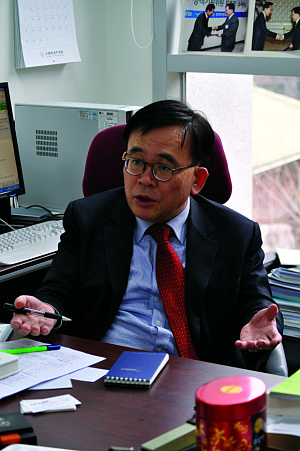
On his desk sits a membership certificate of the Korean National Commission on Sustainable Development and Review Committee. A photograph taken with President Lee Myung-bak on the day he was appointed as a member of the Review Committee for Environmental Law of Ministry of Environment hangs overhead.
Park has been at Ewha as executive director of the Environmental Research Institute since 1998, and the environmental pollution and water-purity control specialist has long been praised for his endeavor in promoting environmental policies.
His career unfolded itself while he was an undergraduate attending Seoul National University.
A poster announcing a special lecture on the future of environmental science by Professor Kyon Sook-pyo (1920-2010), was an eye-opening experience for young Park. “Before the 80’s, environmental studies was a newly inducted studies. I just decided to attend the special seminar solely with the purpose of exposing myself to modern sciences,” said Park. “I have never regretted my decision since.”
The late Kyon, a pioneer of environmental science and the first to be awarded Moran, the Korean National Insignia, in 1989 for his outstanding work on environmental protection, quickly became his life-long role model.
From that very day, Park says he was fortunate enough to seize the opportunity of devoting his life to explore the full potential of a little-known field, while enjoying himself thoroughly in the process.
Decades later, his life’s mission and innovative works continue to save the planet.
Park is continuously seeking approval from the National Assembly for his proposal to initiate “green education,” or a course on green lifestyle, current environmental issues and its possible influences on humanity, in every school. He also hopes to employ a team of professionals to teach the course and foster future environmental specialists like himself.
Despite the early adoption of “green education” in other countries around the world, Korea is falling behind and Park is concerned.
“Japan has initiated an eco-school since 1997, while the United Kingdom and New Zealand also designated environmental studies as a mandatory subject in school,” said Park. “However, Korea, a country that relies 97 percent of its energy on exports and complains of a chronical lack of natural resources, has yet to do so.”
Although he is awaiting the government’s reply, Park emphasizes the importance of public awareness on environmental issues. He believes that “green education” and its recognition should be initiated not only by the Korean government but also the public. The public must realize that green education is the key to the sustainable development of Korea, and students should be the first to understand that environmental issues can no longer be neglected
“There is an international movement of nations to effectively combat climate change and excessive carbon emissions, and the future of Korea depends a great deal on whether our younger generation is ready to join such movements,” said Park. “To become a powerful country in the era of low carbon societies, nationwide education on environmental studies is now a must, not a need.”
ja7122@ewhain.net
Ewha Voice
evoice@ewha.ac.kr

